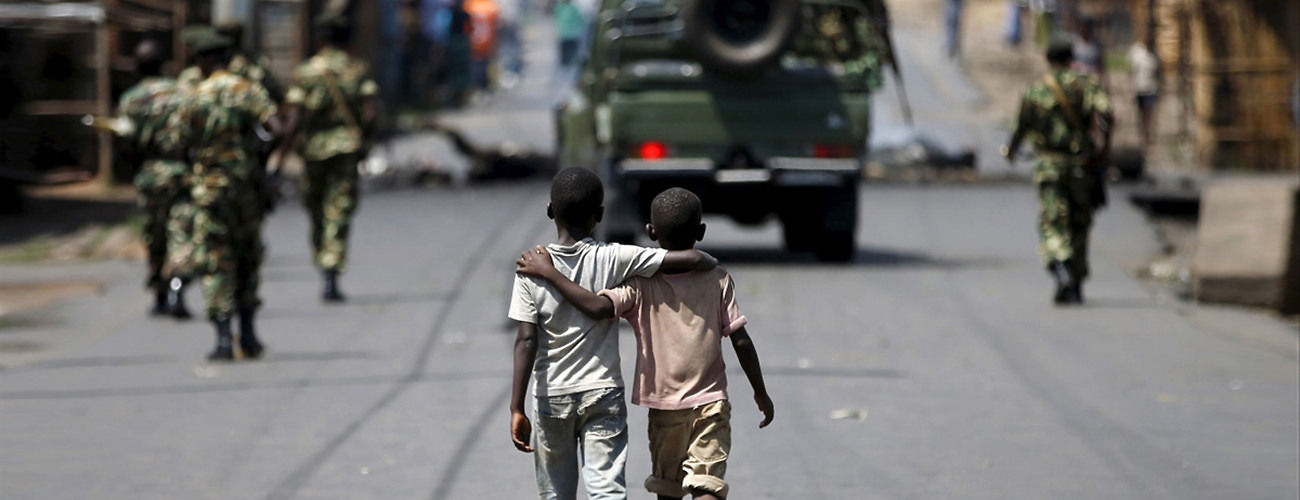The army loyal to President Pierre Nkurunziza of Burundi patrol the capital of Bujumbura following the failed military coup and street protests against the president's bid for a third term in office. (Jordi Bernabeu Farrús/Flickr)
Last week’s killing of three people and wounding of nine in a marketplace grenade attack illustrates the escalation in violence as protests continue against Burundi President Pierre Nkurunziza’s contentious bid for a third presidential term. The prospects for ending the unrest have suffered a significant blow, with minor opposition party Union for Peace and Democracy accusing the government of being behind the shooting of its leader Zedi Feruzi, and subsequently refusing to cooperate with United Nations-brokered talks.
As well as lacking full representation, the negotiations are struggling with neither the government, nor the coalition of civil society groups and opposition political parties allied against Nkurunziza being willing to back down on their positions. Without some change in this regard, it is likely Burundi will see prolonged demonstrations and violence, threatening its fragile transformation into a stable democracy following a long civil war that ended in 2005. Nonetheless, the dialogue is continuing in the capital Bujumbura and remains the best hope for a peaceful resolution to the crisis.
Describing Feruzi’s death as a “wake-up call” for the country’s political leaders, the UN Mission in Burundi and several regional organizations have stepped up calls for a resolution through the talks, while the opposition have asked for larger, but non-violent street marches. Even with over 20 civilians dead and more than 110,000 people displaced by the crisis since protests began on April 26, Nkurunziza will not reconsider his candidacy for a third presidential term, which opponents say violates the national constitution.
Pressured by an increasingly uncertain security situation after an attempted coup on May 13, the government also postponed local and parliamentary elections from May 26 to June 5. The presidential poll, however, remains scheduled for June 26, which has angered the anti-third term movement, on the grounds that the prevailing atmosphere of violence is not conducive for voting. Members of the movement are also angered at the standing arrest warrants issued against many of their leaders, claiming this violates their constitutional right to demonstrate.
A potential solution to the current impasse could come in the form of an increased role for regional institutions. The International Conference of the Great Lakes Region (ICGLR), for example, has called for a swift investigation and prosecution of the killing of Feruzi and other crimes as a way of moving forward. An ICGLR delegation of heads of state from Kenya, South Africa, Tanzania, and Uganda will visit Burundi this week with the aim of continuing the talks and ending the violence.
The East African Community (EAC) has also taken on an active role, with Secretary-General Richard Sezibera developing a roadmap emphasizing the need for regional cooperation, and calling for an end to the violence on both sides. The EAC is also concerned that the 10-day extension to the local and parliamentary elections is insufficient to allow externally displaced refugees to return home to vote, and for political actors to engage in meaningful dialogue to settle the dispute. It is hoping for further negotiations to follow.
Some civil society and human rights groups feel the African Union should also intervene and appoint an independent body to resolve the disagreement over Nkurunziza’s third-term attempt. But the tone of announcements from the AU and EAC mediators thus far suggests they consider it to be an internal matter, to be resolved by Burundians within the framework of the constitution.
Former South African president Thabo Mbeki has been more willing to offer a viewpoint on this, warning that Nkurunziza’s continuing candidacy risks jeopardizing the survival of the 2000 Arusha Agreement, which laid the groundwork for peaceful power sharing between ethnic groups in Burundi. As well as threatening the Tutsi minority and political opposition, its dissolution could also jeopardize gains made by Burundi’s women—the Arusha Agreement required 30% female representation in all state bodies.
Mbeki has considerable authority on the matter, having led the 2000 peace talks and negotiations of the 2006 ceasefire between the government and the National Forces of Liberation rebel forces, which has now transformed into the country’s major opposition party. He now fears that erosion of the arrangements that followed could destabilize the Hutu-Tutsi ethnic balance in Burundi’s parliament, security sector, and wider government institutions.
In the worst possible scenario, Nkurunziza’s actions could lead to the formal rise of an authoritarian Hutu political elite. This could in turn see a resumption of a war which displaced millions and left over 300,000 dead.
For now, it seems regional and international actors are determined to use their influence to prevent a resurgence of widespread conflict. As well as African actors, the US has voiced support for the ongoing dialogue and threatened targeted sanctions against perpetrators of violence, while the European Union has suspended some development aid to the Nkurunziza regime.
These moves have forced the government reluctantly to the table, but it remains to be seen what solution the ongoing talks can actually offer without the full participation of opposition parties, or a complete about-face from Nkurunziza on the pursuit of a third term. Nonetheless, all relevant stakeholders at a national, regional, and international level will need to remain engaged in the process to continue to strive for a peaceful outcome.
Tendai Marima is a South Africa-based independent researcher and freelance journalist whose work has been published by Al Jazeera English, African Arguments, and the Daily Vox. She tweets at @i_amten.





